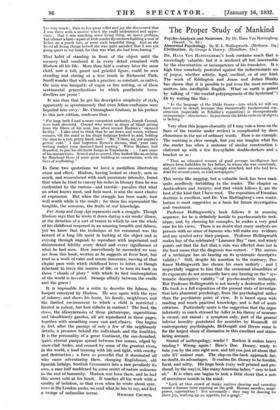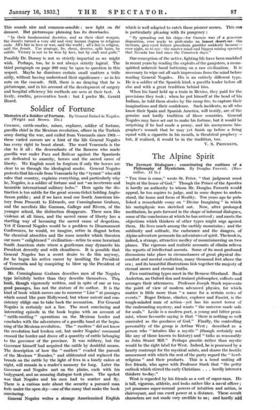The Proper Study of Mankind
Psycho-Analysis and Neuroses. By Dr. Hans Von Hattingberg.
(Daniel. 7s. ad.)
Da. HAAS Vox IIVITINGBERG'S book contains much that is exceedingly valuable, but it is rendered all but inaccessible by the obscurantism or incompetence of his translator. It is . high time somebody protested against the indiscriminate use of jargon, whether artistic, legal, medical, or of any kind. The work of Eddington and Jeans and Julian Huxley has shown that it is possible to put even the most recondite -matters into intelligible English. What on earth is gained by talking of "the morbid polypragmasia of the hysterical"? Or by writing like this :
" In the language of the libido theory—into which we will not here enter in detail, because this theoretically fundamental con- struction (especially in Schilder's exposition) is therapeutically unimportant—this means : In psychosis the libido cathexis of objects is lacking."
Very often this jargon-obscurity (if I may coin a term on the lines of the treatise under review) is complicated by sheer clumsiness in the use of ordinary words. Here is an example. The meaning is clear enough, but you can imagine what fun the reader has when a sentence of similar construction is 'cluttered up with a few five-syllable double-deckers and a 'bracket or so :
"Thus an educated woman of good average intelligence hart always been forbidden by her father, to whom she was consciously, and yet more unconsciously, strongly attached, and who had been dead for several years, to road newspapers."
This seems like nagging, but a valuable book has been made quite needlessly forbidding to the reader. The chapter on Ambivalence and Anxiety, and that which follows it, are the best of the kind that I have read. The exposition of Freudian doctrine is excellent, and Dr. Von Hattingberg's own contri- bution is most suggestive as a basis for future investigation and treatment.
Professor Hollingworth 's book follows it in amusing sequence, for he is definitely hostile to psycho-analytic tech- nique, and, by choosing his examples, he makes a very good case for his views. There is no doubt that many analysts are persons with no sense of humour who will make any evidence and any symbol serve their purpose. Professor Hollingworth makes hay of the celebrated "Linconor Bay" case, and wisely points out that the fact that a cure was effected does not in the least mean that the diagnosis was correct. " The success of a technique has no bearing on its systematic descriptive validity." Still, despite his assertion to the contrary, Pro- fessor Hollingworth has chosen his cases unfairly : and I respectfully suggest to him that the occasional absurdities of its exponents do not necessarily have any bearing on the " sys- tematic descriptive' validity" of psycho-analytic technique. 'But Professor Hollingworth is not merely a destructive critic. His book is a full exposition of the present state of investiga- tion into abnormal psychology, from the psychological rather than the psychiatric point of view. It is based upon wide reading and much practical knowledge, and is full of acute criticism. Particularly acute is the suggestion that the organ inferiority so much stressed by Adler in his theory of neuroses is casual, not causal : a symptom only, part of the general inferior heredity postulated for neurotics by Rozanoff. Of contemporary psychologists, McDougall and Rivers come in for the largest share of discussion in this excellent and stimu- lating account.
Scared of anthropology, reader Y Reckon it makes heavy reading ? Wrong again Here's Doc. Dorsey, ready to take you by the arm right now, and tell you just all about that cute liT animal man. The slap-on-the-back approach has, no doubt, its advantages. It enables Dr. Dorsey to be forcible, lucid, and witty. His huge book (very well printed and pro- duced, by the way) is, like many American ladies, " easy to look at." It is when one begins to look a little closer that a note of uneasiness sounds in the mind.
"- Look at that crowd of dusky natives dancing and crowding round a human torso roasting on the grill. HuMan sacrifice, magic power, superstition ? Not necessarily : they may be dancing for sheer joy, working up an appetite for a gorge." This sounds nice and common-sensible : new light on the dansant. But picturesque phrasing has its drawbacks.
" In their fundamental doctrine, and as their chief weapon, the Jesuits turned a very old and very human dogma to religious ends. All's fair in love or war, said the world ; all's fair in religion, said the Jesuit. Use strategy, lie, cheat, deceive, split hairs, be subtle. Victory is not to be won by love, but by craft and guile."
Possibly. Dr. Dorsey is not so strictly impartial as we might wish. Perhaps, too, he is not always strictly logical. The third paragraph on page 209 may be open to question in this respect. Maybe he dismisses certain small matters a trifle airily, without having understood their significance : as in his note on the couvade. Still, there is no denying that he is picturesque, and in his account of the development of surgery and hospital efficiency his methods are seen at their best. A lively, erudite, provocative book : but I prefer Mr. Gerald Heard.



































 Previous page
Previous page